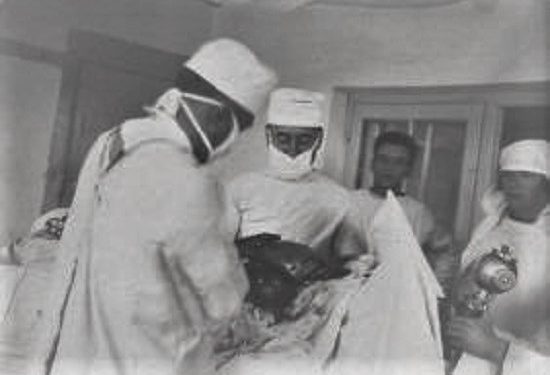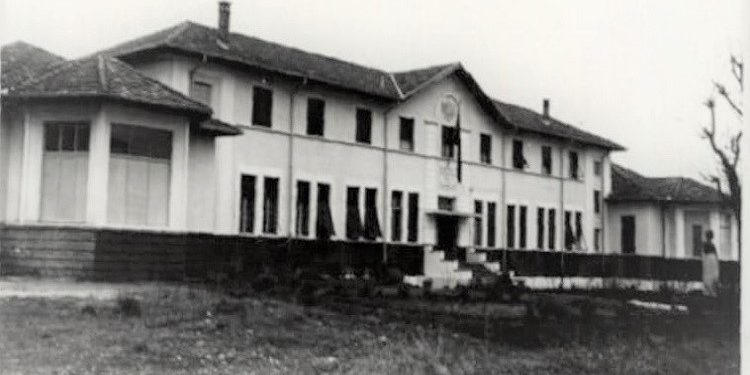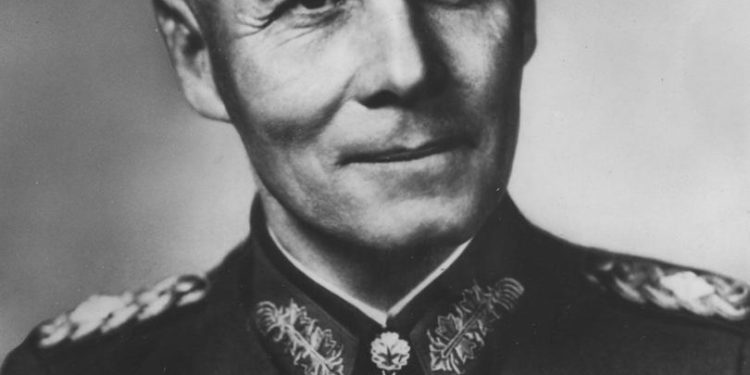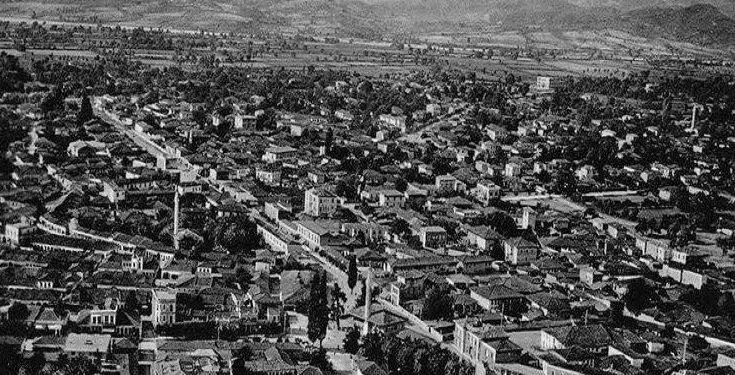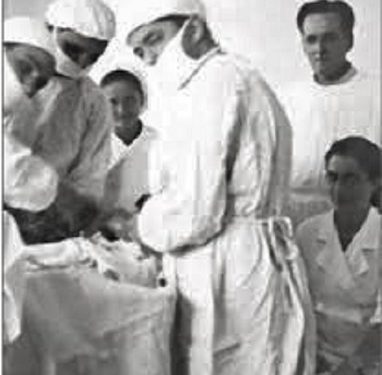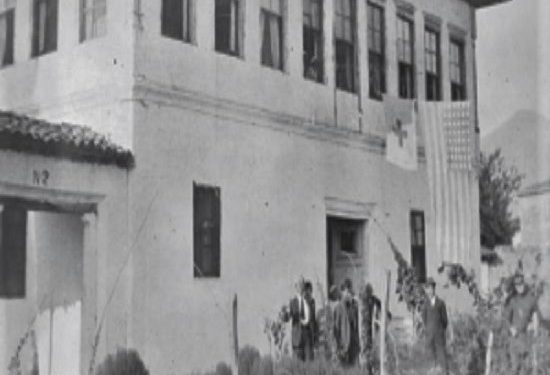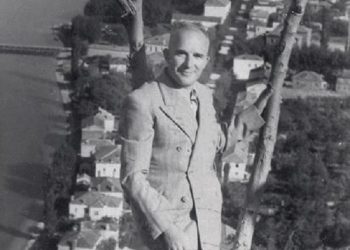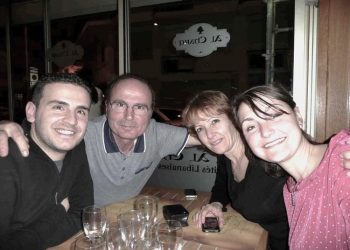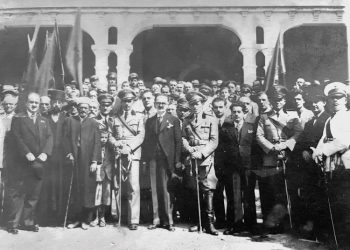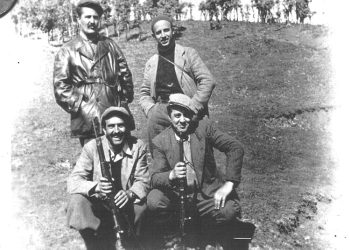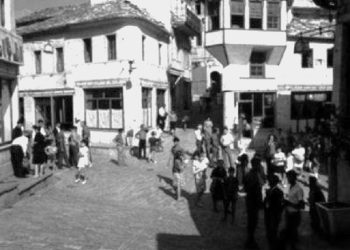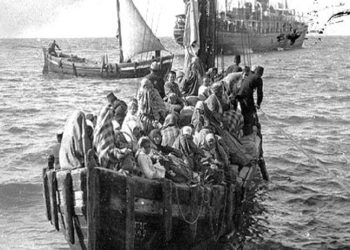By Denisa Kona
The first part
Memorie.al / The history of the Bakalli family is that of one of the oldest Tirana families, with traditions. In one of the five houses left by the father (moved a little further from the 2000-year-old one – where the “Beer House” is located today), in the heart of Tirana, lived the last of 6 brothers, from a mother and a grandmother and one of the 24 children of the Kadi of Tirana – as the city’s judge, Hasan Bakalli, was then called. His story is one of the rarest, as you might expect to hear from a man in deep old age and with a very rich life of all kinds. Although his speech was a little hindered by the paralysis he had suffered some time ago, he called it a miracle that he has returned that ability. And this is what he showed us laid out in his house, filled with books, decorations and religious symbols.
“My father was a master. Hoxha, meaning law teacher. He lived 116 years.” This is how Doctor Qazim Bakalli started his story. – “Father was the Kadi of Tirana, who at that time came second after the King”. While we tried to make the connection between the old man’s confessions and the notes on the photo, to make them more precise, we found the correspondence with the note behind the photo of Kadi: 1834-1950. Doctor Bakalli said that his father worked until the end of his life and retired during the dictatorship. He had studied Turkish, and then went to Turkey where he specialized in Turkish legislation, the Sherihat. He then continued his specialization in Iran.
Hasan Bakalli was known as the first specialist for Sherihat in Albania, especially in the field of property legislation. But in his hands, the whole life of the capital had passed. There, in front of him, human lives, marriages and divorces were connected and resolved. There was nothing similar to the image of today’s judge. Qazim remembered that his father never took bribes and it was said that he was so clean physically and spiritually that when a fly fell, he made honey. He was a man who was never talked about and he put order in the life of the city with the right decisions, reducing criminality of every form and influencing, strengthening the clean relations of mankind.
But his family life was not without its ups and downs. He was married five times because the women did not live. Thus, marriage after marriage, he added to the family, which counted a total of 81 members. “Only with my mother, father made 6 sons (among them me) and one daughter. Everyone was educated in primary school, because there was nothing more than that then”, Doctor Qazimi told us, pointing to the Pedagogical building, today the economic high school. At that time, primary school was 6 years, but two years could be taken in one year, by taking the exams. Thus, Qazim finished school in 4 years, before the arrival of Harry Fultz, whom he remembers as a great man, who unfortunately, the communist regime, would later label as an agent. After primary school, Qazimi attended the State High School located in front of the National Bank. In 1939, he went to Bologna to study Medicine. But suddenly he returned to his homeland…!
Dr. Bakalli: “My mother died in childbirth. I don’t have a photo of her”!
His father was born in 1834. Qazim himself, then 88 years old, was born in 1921. His father, in his third marriage, made Qazim when he was 87 years old! A total of 24 children. But Qazim was not even the youngest of the children. “My mother was the third among my father’s wives,” he said. “After me, they had another child, a boy, in whose birth my mother died.” I miss him a lot and I don’t even have a picture to look at his portrait. I don’t remember, I was only two years old when she died. But at that time, because of religion, a misplaced superstition, women were not allowed to appear in photographs”, he recalls. Their faces are lost in time. While from the fourth marriage, his father, Kadi of Tirana, gave birth to two more sons. The last, when he was 107 years old. The last brother of the great Bakalli family should have been 72 years old today. With the fifth wife, Kadi Hasani had no more children, but rose as his own, a daughter that his wife brought with her.
Proud of his son’s famous violin in France
Doctor Qazimi gave birth to three children, a boy and two girls, whom he said he could not even, separate for love from each other. There is no first and second, they are all the same. Although someone achieved more in life and someone less. Thus, his eldest son, whom he named after his father, Hasan, became the most famous artist in France. In a city near Germany he teaches as a violin teacher. After graduating from the High Institute of Arts in Tirana, the young Hasan worked for a long time as a teacher at the Artistic High School “Jordan Misja” in Tirana and only after 90, he left for France. His son followed the same path. Grandfather Qazimi kept on the table, the publications of the French media about his son and grandson, Marlen (which means happy birth), their concerts in France and meetings with the president of this country. On the wall, concert photos.
While Hasan’s second son, Bengu (the first sound, according to the philosophy of the Creation of the world from the cry of a bird), is likely his grandfather’s. He owns several foreign languages and now, he has gone to China to learn the language of this country. Meanwhile, his daughter, the eldest, who also graduated with honors in piano and conducting, after years of career in Tirana, where she was, among others, the director of the Palace of Culture before the 90s, lives today with her family in Italy, and works as a secretary in an enterprise. A job outside the nature of her profession.
While the second daughter, his youngest child, although the father never calls it a disappointment, did not fulfill his dreams. He had thought about her, that she would take her own path; she would become a lady doctor. But after three years of studies, she abandoned them. “Even love and Medicine are not done at the same time, said doctor Qazimi. – Even two big and important things are never done at the same time. She fell in love and left her studies. Her boyfriend was looking for a child from her, when the conditions were not right. She gave birth to him some time after, but he did not respond to her obligations. He called him from Italy and when he heard his baby’s voice on the phone, he didn’t ask once what is this crying child”.
After that, he was no longer alive. But grandfather Qazimi is very happy for this wonderful creature that his daughter brought to him, even though out of court. The girl around 8-10 years old entered and left the house, as he pleased, with the unusual beauty of a little lady, as if dropped from the sky or, as if bubbling from underground springs. And great in lessons. She lived with her mother and grandmother, one floor above her grandfather. She didn’t go in there before; her grandmother didn’t like her keeping company with the old man, who talks a lot about morals. Even the little one pretended to hold a grudge, but he was satisfied that he could see her every day, open the door for her, call her when someone came there.
The little girl (the one he had photographed with when she was a baby), saw her old father little by little every day. He took her downstairs, took her shopping, sometimes cooked something for her, but that was it. “The mother continues to be dictatorial and imposing with the children even today. She doesn’t let them come and stay with me”, he said. “The children, even when they are a year old, come from abroad, stay 15 minutes at my place, then go upstairs, stay there, eat and drink at their mother’s.” However, he felt lucky that they were close and could feel their tapping on the ceiling.
Doctor Bakalli: “I tell you my life as a guerrilla, the group of pioneers I led, where Ramiz Alia was”
Spring 1939. At that time, the Albanian youth was called to return to their homeland. “I came back because after religion, there is the homeland,” said Qazim Bakalli. – On April 1, 1939, I got involved with the Movement”, – says the old doctor. But the life of the mountain was only a short period. Qazim lived a guerrilla life. “Our actions were inside the city, – he confesses. – At that time, I was a member of 10 anti-fascist groups, among them in the youth group, in the guerilla unit; I also led one of the anti-fascist groups of pioneers, which were organized according to neighborhoods. They were like “Debatiku”, which you know, he remembers. – Ramiz Alia, then a pioneer, was a member of the group I led”. Also, Qazim was a member of the university group as well as some other groups that had members outside the country. Since he was studying in Italy, the Communist Party had charged him with a task: He would go to the neighboring country to take two exams and there he would also meet a person in Milan. They gave him the address and a good amount of money. An Italian, connected to the Movement, would be waiting for him there. He would give him a radio transmitter. He bought it and left for his return.
“God has helped me,” Qazimi said, “as he began to tell the vicissitudes of that great action.” – I don’t forget the anxiety of traveling by train from Milan to Brindisi, for a day and a half. By steamer, it was impossible to travel due to the bombardment of English submarines. You must know that the English are the enemy of all mankind. Finally, I arrived in Brindisi, from where I would leave for Durrës. No steamer left there for a week. For a week I stayed there with my suitcases and the radio transmitter.
Young Germans, 16-17 years old, who were going to the front to Asia, passed right by me. At night, for a week, I slept next to them in the lobby of a hotel, with a communique on my chest and a revolver in my belt. General Rommel, the commander of the Germans, slept next to me. Now this scene reminds me of that movie where the comic actor slept among the Germans”, said Doctor Bakalli
Finally, they announced that the steamer for Albania was ready. During this time, the traveler’s luggage was kept in a building. “When I go there to get my suitcases and radio transmitter, they tell me: They took them! How did they get them? I said shocked. Then, I was directed to a long room where there was a table and some shelves. There was the customs officer and another with a republic hat, an Italian spy. When I saw my suitcases and the radio transmitter, I thought: I’m done. I say to the customs officer: Sir, I am the owner of these. He tells me: Open the suitcases: Let’s see what you have inside; gold or guns? I told him I lost my key.
Then, he put his hand on the radio-transmitter and said to me with a smile: Radio-transmitter eh…?! I looked him in the eye and without catching the spy’s eye, I approached him and said: I am a doctor (although I had not yet finished my studies) and I needed this equipment. It’s a radio receiver. And in the meantime I extended 5000 lire, that at that time with that much money, a student in Italy would spend a month with food, and with the repayment of all other payments. He quickly put them in his pocket and with yellow chalk, wrote on top V, which meant that, the luggage had been seen and; passes”.
But still, Qazim, who never forgot to thank God, remembered that in that action, he was helped by the fact that the Italians are humane and, as much as the war is dangerous, the danger was mitigated by their nature. As for the Germans, they didn’t forgive you, but at that time they didn’t know where their heads were, – he said. – They were trouble on their own, they didn’t care about me. So with all the radio-transmitter and two suitcases I found myself on the steamer, where fortunately, there was no control. However, fear did not let me sleep. There I met an Albanian who was with the movement and I asked him for help. I said: Get a gadget from the radio transmitter, so that it is not known what it is. He replied: ‘You took it on yourself, now keep it’. After the war, this man was a prosecutor”, – recalled Qazim Bakalli, adding that he was also a party member and regular spy. It has hurt a lot of people. He was originally from Shkodra…!
“When I arrived in Durrës, I remembered that I escaped, but I didn’t. Here was the worst. As soon as I landed at the port, they said to me: What is your name? Qazim Bakalli, – I told them. Qazim Bakalli huh…? The one who has taken on the task of bringing the radio-transmitter?! Four spies immediately surrounded me, he recalls. – There I said that I would not escape, but after a while, the guerilla unit, which was covering my actions, arrived there and when I saw the muzzle of the cobra on the back of one of the spies, it looked like a cannon muzzle, to be honest. The customs officer who was a spy turned yellow became waxy, covered with sweat and hurriedly said: Yes, yes, pass. Go, go. When I came to Tirana, to our house, which has become a Catholic Church, I found Vasil Shanto’s brother there, a nephew of my father. He said to me: “Shall I issue you a statement for this service you have rendered to the movement”? I then said to him: What do I need the statement for? However, sometime after the war, I asked him and he refused”, recalled Doctor Qazimi. So Qazim Bakalli, a 21-year-old student in Italy, brought a radio transmitter to Albania for the first time in 1943, a difficult action in the service of the anti-fascist movement.
Between war and faith…!
“My conscience would kill me if I had killed someone in the war,” Qazimi said. After this long confession, we ask Dr. Bakall: How is it possible for both a religious man and a participant in the war? Wouldn’t your conscience kill you, to kill people?! “God says that when they attack your property, your home and your family, turn and fight. The homeland is our wealth, our home and our family”, he said. He further assures us that; today his conscience would have killed him, although he would have killed even a German. “I wasn’t even mentally prepared to kill…”
While telling us this reflection on the course of events and the philosophy of the war of a believer, Dr. Qazimi affirmed that; “When you are very young, war often seems like a simple job, you don’t even think that you have to kill or that you can be killed. Youth has illusions; it overcomes difficulties without thinking deeply. And adds: The only just war is the one that brings peace and salvation to peoples. In the Koran, the word ‘Salam’ is often mentioned, which means ‘Peace’, he said.
Every day among holy books and medical literature
Doctor Qazimi said that there is still a need for knowledge and knowledge is a blessing “He, who does not accept Christ as Muhammad, he is not even a Muslim…! The Koran mentions Christ (Jesus) 5 times in 5 chapters and Mary 3 times”, Doctor Qazimi told us as he led us to the gate. On his shelf were both the Gospel and the Koran. Doctor Qazimi read these holy books every day, along with scientific medical literature and books in foreign languages. 7 open books on the bread table, the writing table and his bed, were the world where he revolved the day we met him. Returning to reading religious books, he said that he found many common points between the Bible and the Koran, which excited him and continued to excite him, because as he said: “This convinces me that the word of God is one”.
His house was a strange microenvironment where the religious spirit mingled with the academic spirit. Sometimes, you get the impression that you are in the house of a person who follows religious rituals, sometimes you are in the house of a scholar. The walls are filled with fragments of time, sometimes a painting of their old house, a gift from A. Basha, Qazim’s son-in-law’s brother, sometimes war decorations, further medals and certificates of honor, such as Doctor of Medicine, newspaper clippings, about the career of the violinist son in France, the national flag, Mecca in the tapestry, the eyes, chapters of the Koran in a piece with bright letters, new and old family photos and in front of them, the portrait of the father, Hasan Bakalli, former – To the Kadi of Tirana, who came second after the King, together with his stick, which his son has a precious memory of. The stick has been hanging on the wall since his father passed away.
Doctor Qazim was a devout Muslim believer, but within his devotion, there was also great religious tolerance. During the years of his youth, he said that he attended churches in the countries where he lived, such as Italy, Yugoslavia, Romania, and Bulgaria, where he went every Sunday, since there were no mosques in these countries or they were too far away. “The important thing is that you pray to God”, – he says, – even though due to his age he was supposed to be a fanatic of his religion. However, he did not part with her rituals, since the age of 7. He fasted regularly and prayed five times a day. Even after midnight.
The professor’s accident and experiment
Doctor Bakallin, you didn’t look at him a day without reading; religious and scientific literature in different languages. His mind kept French and Italian, like Albanian, then English, German and Slavic languages; among them Serbo-Croatian, Bulgarian and Russian. 35 years ago, he had a bicycle accident. He was hit in the head. He remembers his colleagues gathered over him, discussing: should they open his skull or not?! The chief, a man who was later shot dead, said: “This one knows 7 languages. Let’s ask him”! And they began to provoke me as a man with all kinds of abuse, each in one of the languages of the countries where they had studied. I, with my eyes covered with blood, was answering everyone, without leaving any shortcomings. Then the boss, whose name I don’t remember, said: “He reacted, there was nothing.” The experiment worked.
“While I was signing the divorce paper, it seemed to me that I was signing my own death”
Love does not ask about others. Doctor Qazim also closed his eyes. Despite his barren biography, Qazim decided to marry the girl who would be his wife for many years, the one who was the most beautiful among his friends. This is how he explains the reason. “She was the most beautiful girl in Tirana. I knew her for years, because she used to come to us, she was friends with my niece. It was also quite intelligent and suffered”. Thus, he was sorely tempted to have her every day of his life before his eyes.
But apparently, her childhood, shaken by her father’s punishment, would disturb the life of their family. “The woman was suffering from nervous disorders, – he said – and I, as a doctor, felt guilty because I had not shown proper attention to her health. She complained to me and I told her: Go, there are plenty of doctors”. Qazim, who had cured the whole world, felt guilty, once as a husband and twice as a doctor, because he had not offered his wife the proper help. Consequently, their family life, with her condition, was shaken.
Qazimi showed the outbursts of his wife even at midnight. “He used to kick me at 1 o’clock in the morning and say: Why don’t you love me?! Arguments even over the most trivial things, – he said. – Why do you leave it here, why don’t you leave it here? One evening, on New Year’s Eve, he threw a glass of yogurt in my face, gouged out my eyes. Then I decided to beat him”, Qazimi said. He stated with regret that he had beaten his wife several times, but he could not do otherwise, because she had unbearable behavior. She threw things at me, hit me. I beat him more than once. I used to beat him because he choked me with words. But I’m not proud of it. I call myself ignorant and rude, even though life with my wife was unbearable. There was no man who could push him”, said Doctor Qazim Bakalli not without regret. Memorie.al
The next issue follows




